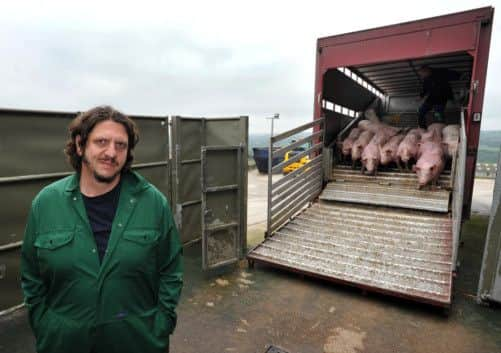The Big Interview: Jay Rayner


Jay Rayner is on a mission, and it’s not a small one.
He wants us to look at the way we eat and produce food – and change it.
“The doctrine of local food is dead,” says the outspoken Observer food writer, One Show food reporter and Masterchef judge. “I know I’m not going to be popular saying so, but we have got the change the way we produce food.”


Advertisement
Hide AdAdvertisement
Hide AdIn his first book for five years, A Greedy Man in a Hungry World: Why almost everything you thought you knew about food is wrong, Rayner takes it upon himself to debunk a lot of the industry’s most cherished sacred cows.
Although a lover of farmers’ markets, Rayner believes that they are merely a lifestyle choice for the affluent and not a sustainable food blueprint in a world whose middle-class population is exploding.
He is aware that his food message will be hard to swallow for a generation who have been told that shopping locally and seasonally is the only thing to do and buying some very expensive chicken is one way in which they can help save the planet.
“I am not saying the you shouldn’t buy local food, but by doing so you shouldn’t think that it is an economically, sustainable thing to do,” says Rayner who chose to launch his book at the recent Malton Food Festival.
Advertisement
Hide AdAdvertisement
Hide AdThe former Leeds University student and son of the late agony aunt Clare Rayner, has been worrying about how the world’s population will feed itself for some time.
“The unpalatable truth is that we will soon have nine billion mouths to feed, and we aren’t going to do that by flogging free-range chickens from a stall in Borough Market,” says the 46-year-old.
Rayner is not afraid to speak his mind. He believes it is time we all woke up to the fact that growing the odd organic carrot in our back garden may make us feel better, but it makes no sense economically.
“Shopping locally does not always mean shopping sustainably and that’s where people have been misled,” says Rayner who lives in London with his wife Pat and two sons.
Advertisement
Hide AdAdvertisement
Hide Ad“When people talk about food miles and carbon footprint it is about far more than just how close you are to where your food was produced. It’s about carbon inputs all the way down the production system. It’s about water usage, land maintenance and the careful application of science.”
It is the spectre of the exploding Chinese and Indian middle classes and their new found hunger for meat that got the journalist researching exactly how our food is produced and the realisation that the only way to feed the world is through something he calls “sustainable intensification”.
“In 1975 China was eating an average of 10kg of meat per head per year, in 2010 it was 45kg per head and that is expected to increase to 69kg per head and it will keep growing. The population is expected to reach nine billion by 2050,” says Rayner spitting out the statistics like rounds out of a machine gun. “According to the United Nations, by 2030 we will need to be producing 50 per cent more food, and a system built around that holy trinity of local, seasonal and organic simply won’t cut it.
“I will not be popular saying that we need large scale food production, but it is the only way. The key is to make sure that it is sustainable.”
Advertisement
Hide AdAdvertisement
Hide AdRayner has always had an interest in food, primarily the eating of it. Much of it he lays at the feet of his famous mother, the late Claire Rayner.
“I have always been greedy,” he says. “Food was always very important in our house. I have always wondered about my mother’s instinct to over-cater. It could been seen as a reaction against a childhood of poverty and not having enough.”
Both his parents had meagre beginnings with Jewish working class backgrounds when many Jews in Britain were still at the bottom of the heap.
His mother’s parents he describes as “mostly feckless and on the run”.
Advertisement
Hide AdAdvertisement
Hide AdClaire eventually met and married actor Des Rayner, who later became her agent.
“Then in 1972 we fell rich,” writes Rayner in his book. “That was the year my mother became famous.”
She’d already published a number of novels but in 1972 The Performers sold paperback rights in the US for $250,000. In the same year she landed a weekly agony column on the Sun newspaper and a regular slot on Pebble Mill at One.
“Claire fed us as if food was a defence against the brutal realities of the world,” he writes. “I became greedy because I was in a position to be so. Greed was presented to me as a lifestyle choice. I decided it was one that would suit me very well.”
Advertisement
Hide AdAdvertisement
Hide AdRayner freely admits that he struggled to shake of the shadow of his larger-than-life mother.
Now, however, he has emerged as his own man with very much his own identity, carefully crafted with just enough television exposure to make him a household name.
Growing up in a world where he could often share the dinner table as a child with five national journalists, it was no surprise when he decided at the age of 15 that he wanted to write.
Although he decided to read political science at the University of Leeds the decision was more down to the fact it had a very good student newspaper, which he went on to edit as he had planned.
Advertisement
Hide AdAdvertisement
Hide Ad“The editorship of that (the student newspaper) was a full-time post to which you had to be elected. I thought if I got elected then no one could accuse me of nepotism, but it didn’t make any difference.”
From Leeds he joined the Observer where he reported on a variety of subjects before becoming their food critic. He has made a number of successful forays into television, some serious some not so serious, something he sees almost as a necessary evil. Although he says he is thoroughly enjoying being the food reporter for the BBC’s The One Show.
But it is his current project which has taken up all his time and has drawn more on his investigative skills. As part of research for A Greedy Man in a Hungry World he spent two days at John Penny’s abattoir in Rawdon, Leeds.
“I have become convinced that we are disconnected from what real food production means, and therefore afraid of it,” he writes. “We need to understand how it works, be unembarrassed about it, because only then can we genuinely push for the kind of sustainable supply chain which both guarantees quality and that our food will be affordable, though not necessarily dirt cheap.”
Advertisement
Hide AdAdvertisement
Hide AdHe writes graphically about his time in the abattoir helping pigs, sheep and cattle to slaughter, working on the “kill line” and the pig tank.
“Penny is a rare business, an integrated beef farm, slaughterhouse and butcher, famed not just for sending some of the highest-quality neat to market, but for its complete openness. That part of the book is very graphic, and it’s graphic because it’s meant to be.”
Rayner believes we need to start paying more for our food so that the supermarkets can start paying their suppliers more. “That will enable to farmers to invest in agriculture so, in turn, our food self-sufficiency can start to rise again.”
Britain is only about 56 per cent self-sufficient in food. As a result prices are going to rise naturally as demand for food grows.
Advertisement
Hide AdAdvertisement
Hide AdUnless we pay more for our food, we’re going to find that producers will sell to China, India and Brazil instead of us. Our demand, for cut price food, he believes, led to the recent horse meat scandal.
“Everyone knew something was going to happen,” he says philosophically. “We need to stop pushing for cheaper and cheaper food.” He believes there could well be another food scandal around the corner.
“The age of cheap food is well and truly over,” he says.
Rayner was helped in his quest by Tim Benton, Professor of Population Ecology at the University of Leeds and the UK Champion for Global Food Security who helped him realise that the very idea of a fully sustainable food production system is an ideal.
“As Professor Benton put it to me, it is like happiness or intellectual fulfillment. It is, he said, ‘an aim, not an actuality’; it is something we will constantly strive for and journey towards without ever completely reaching.”
Advertisement
Hide AdAdvertisement
Hide AdBut he believes it is a journey we have to embark on, even in some small way. “Even the Rayner family is having a meat-free day of the week. And I never thought that would happen,” he says. “I give credit to my wife. She said I couldn’t argue that people should eat less meat and then not do so ourselves.”
The book ends with Rayner’s summing up of what he has discovered, while admitting it is all “ear-bleedingly, eyeball-gougingly complicated.”
That said, he has managed to make a serious subject funny, interspersed with memories of growing up with the UK’s most famous agony aunt.
A Greedy Man in a Hungry World by Jay Rayner is published by William Collins priced £12.99.